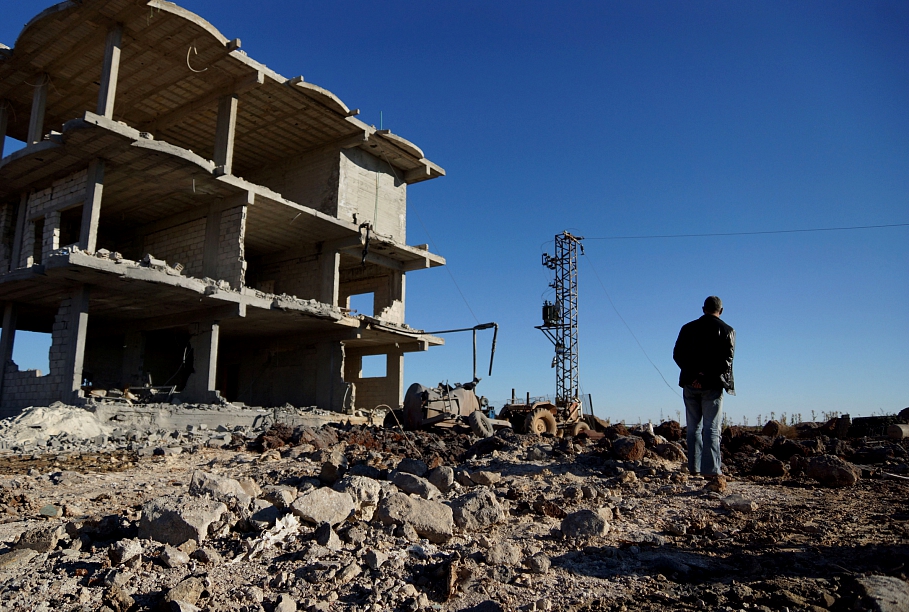From the hands of American soldiers to truly radicalizing - Māris' story
Māris Ahmed Bergholds, a sociology student, first came to prominence in 2003 when he was freed from an American prison in Iraq. Later on he penned a book that was published in 2012 under the name of Islam as translated into Latvian. He disappeared shortly after its publication, LTV7's Lichonye Delo had reported previously.
His mother Regīna Bergholde had turned to the Chas daily in 2003 with a Red Cross letter from her son, who was in an American prison in Iraq. Berholds complained about his mistreatment at the hands of American soldiers. He later wrote that his head had been beaten with the doors of a Humvee, and that he had been hit with plastic bottles and books as those don't leave bruises.
Bergholds had gone to the Near East as a newly-converted Muslim. According to his book, he wanted to learn the ritual prayer and to learn more about Islam; if he would have had time, he would also have conducted a survey for his graduation paper, related to democracy in Arab states.
As staying in Turkish Ankara proved too expensive and he couldn't get a Syrian visa, he went to Iraq to visit Erbil. His route went through the city of Mosul where someone stole his camera. Berholds turned to the authorities. The local police, in turn, handed him to American soldiers who considered him to be a foreign mercenary. He spent several months in different prisons.
Upon his return to Latvia, he started openly blaming the US for escalating conflict in the Near East.
After his stint in the Near East, Bergholds, who had been actively interested in Islam, became a true convert, according to his mother.
"In reality he wasn't a Muslim yet [before he went to the Near East]. The time spent in prison, as well as the Quran as the only reading material dragged him in," his mother said.
He graduated from the university back in Latvia and organized a forum for Latvian Muslims. In 2008 he decided to go to Sudan to study Arabic. It's in Sudan where he wrote his book, which relates the basic tenets of Islam. The book is interspersed with his own experiences but doesn't endorse extremist views.
Shortly afterwards, Bergholds disappeared.
Oleg Petrov, a representative of Latvian Center for Islamic Culture, wrote on the parislamu.lv website that "In summer 2012, Ahmed [Māris Bergholds] has gone missing. According to unofficial information, he has chosen the path of God in the Near East, where he has in all likelihood become the first Latvian shahid. God is great."
After about six months of silence, Bergholds wrote to his mother saying that he had reached Syria, and that she would be informed if he'd be 'granted a ticket to paradise'.
According to De Facto, in spring 2013 Bergholds had tried freeing convicts from the Alepo prison. It is highly likely that he had joined an extremist group. Bergholds had known that he is considered a terrorist in the West, and US authorities had visited his sister, who is living in the US.
In one of the clashes Bergholds wounded his arm. He contacted his mother for the last time in October 2013, when he was 33 years old.
It wasn't a good-bye letter though - Bergholds simply related how his arm is healing and inquired about his sister. His mother Regīna thinks there are two possible outcomes - "either he is no more, he has died in Syria, or he is detained, but I will never believe that he'd become a shahid and blow other people up," she said.
Mārtiņš - finding and sharing his faith on the internet
The second Latvian who may have become radicalized was Mārtiņš, a young man from a large farmer family. He had a great command of English and, according to his teacher, he was a loner who spent his free time alone and didn't have any friends. "His world was the internet, the computer, the double life, the night life," his teacher, who wished to remain unnamed, said.
In grade 12 Mārtiņš became interested in Islam and started frequenting one of the largest online forums dedicated to Islam. His mother knew about this, but his father wasn't in on it.
Mārtiņš was an active poster on the forum, until the time he left Latvia. According to De Facto, he had written more than 1,500 posts in 9 months. He wrote, for example, that he wanted to move to another country, like Malaysia, where there are more Islam believers.
The growing radicalization of Mārtiņš' worldview can be traced from his forum posts.
In spring 2014, he decided against going to the university upon graduation and made up his mind to move to the UK after finishing school, and to go to the Near East from there. At about that time he also went to Helsinki where he met his best friend, whom he had met in online gaming and had turned to Islam. Both Mārtiņš' and his Finnish friend's forum posts ended on the same day in August 2014.
This February, Finnish YLE revealed Mārtiņš' friend to be a lonely, unsociable young man from eastern Finland.
While De Facto didn't delve deep into the youth's possible activities, the YLE piece details the possible activities of his Finnish friend, with whom Mārtiņš was very close.
"[..] he says that everything is going well for him in Syria, but he has not yet joined the fighting--at present he is mainly on guard duty. Based on his Twitter account, it seems he has been in Hama, Homs and Raqqa, the capital of the self-proclaimed Islamic State," reported YLE.
Security Police has analyzed these and similar cases and concluded that Europeans are attracted to Islam fundamentalism through the internet. These people may be joining the ranks of fighters by going to conflict zones under the pretext of "strengthening their faith and visiting holy sites".





























